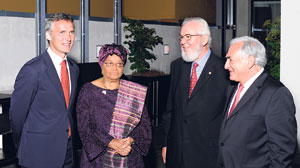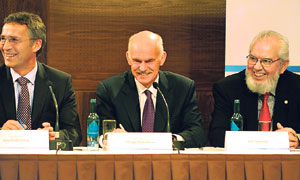OSLO – When International Labour Organisation (ILO) Director-General Juan Somavia and IMF Managing Director Dominique Strauss-Kahn walked into the ballroom of the Radisson Blu Plaza Hotel here on a windy Monday (September 13) morning, history was in the making.

The heads of the ILO and the IMF with the Prime Minister of Norway and the Liberian President (second from left) |
For many reasons too. Firstly the two organizations with contrasting mandates were now aiming to play once-alien roles with the IMF looking towards job creation against its macro-economic stability agenda while the ILO looked in the direction of economic growth through jobs creation. Secondly oil-rich Norway which has traditionally been a centre for global dialogue and world peace – in fact being a facilitator of the Sri Lankan peace process -- was now dabbling in a totally unrelated field: challenges facing the global economy and its solutions.
And to support this initiative were world leaders of the likes of Prime Minister Jens Stoltenberg of Norway, Prime Minister George Papandreou of Greece, José Luis Rodriguez Zapatero, Prime Minister of Spain and President Ellen Johnson Sirleaf of Liberia, and prominent Ministers such as Christine Lagarde (Finance) of France and Ian Duncan Smith (Labour) of the UK backed by high ranking union leaders like Sharan Burrow, Director General of the International Trade Union Confederation, and not forgetting a host of eminent economists and journalists.
This was the first such joint endeavour by the ILO and the IMF and attracted some of the brightest academic minds on the planet and experts on growth, employment and social cohesion.
IMF’s Strauss-Kahn drew reference to this in his presentation saying the Oslo Conference was a historic step in strengthening collaboration between the ILO and the IMF and that “it is no secret that we have not always seen eye to eye”.

At the press conference |
Nevertheless, he added it was also quite inspirational in its atmosphere of cooperation and shared a sense of urgency about the need for increased attention and focus on unemployment—and to bring that issue much higher up in the policy mix. The ILO estimates that, over the next 10 years, more than 440 million additional jobs will be needed to absorb new entrants to the labour force. “So the challenge both today and in the years ahead is huge,” he noted.
More than 210 million people are currently out of work worldwide—the highest level of official unemployment in history. “They (participants at the conference) spoke of the human impact in terms of persistent loss of earnings, reduced life expectancy, and lower educational achievement for the children of the unemployed. And they spoke of a potentially ‘lost generation’ of young people whose unemployment rates are much higher than for older groups,” he said.
Mr Strauss-Kahn said the financial crisis would be over only after unemployment decreases. “We need growth—but we need growth that increases employment. An economic ‘recovery’ that does not translate into jobs will not mean much to most people. Frankly, most people will not notice whether growth is a percentage point or two higher. But whether unemployment is 10 % or 5 % is a big deal.”
In a strikingly un-IMF-like speech which drew thunderous applause, the IMF chief said the labour markets and workers are paying a heavy price for no fault of theirs … and owing to a mistake made by others. “We must not underestimate the daunting prospect faced by a generation where if you lose your job, your children are more likely to do badly in school,” he said adding that one needs to look beyond economic stability.
Some governments have stepped up placement services and expanded labour market programs aimed at improving skills and job search. Others have implemented policies allowing firms to retain workers, while reducing their hours and wages–thus spreading the burden of the downturn more evenly. Another step is to allow unemployment benefits to be extended. Subsidies targeted at specific groups—the long-term unemployed and youth, for example—can also stimulate job creation, he said, echoing a view shared by policymakers in affected countries but perhaps for the first time articulated by the IMF.
“We all need to think differently and more creatively: about the new economic forces at play in the post-crisis world; about the better integration of employment policies with macroeconomic policies, nationally and internationally; and about how to develop a wider array of policies and programs that can provide work for all who want it,” he said.
For his part, ILO’s Somavia –widely credited for drawing the IMF into the fold of creating jobs and eliminating poverty through sustainable growth – noted that there were signs of a fragile recovery, but for millions of people and enterprises around the world the crisis is far from over.
“A jobs-centered growth strategy should be our number one priority. Otherwise, the economic recovery may take years to reach those who need it most, or it may not reach them at all. We must connect our policies with people’s legitimate aspirations for a fair chance at a decent job,” he added and emphasized that financial stability and social stability go hand in hand.
Unemployment rates in advanced economies vary. The unemployment rate has increased by 3 percentage points in advanced countries since 2007 and by a ¼ percentage point in emerging markets. Within the advanced economies, some of the largest increases in the unemployment rate have occurred in Spain – where the rate increased by nearly 10 percentage points – the United States, New Zealand and Taiwan (China). In contrast, in Germany and Norway, the unemployment rate barely budged.
Others agreed with the IMF that the world has changed forever and a new economic model is emerging. The Spanish Prime Minister raised the question of whether the new economic order will reform the IMF and urged that social protection schemes should be directed to the worker instead of the workplace.
ILO’s Somavia raised a very interesting point – very relevant to Sri Lanka. He said cooperation was essential in finding solutions for the jobs crisis. For example, he asked, how does one get the political leadership to see these issues as non political? “We often see systems where the opposition sees this (crisis) as a way to win the next election (not as a national issue and not to score political points),” he said. (Sri Lanka take note: This is the bane amongst all opposition parties over the years and the reason why there is no coming together on national issues).
Another lesson from Norway is that federations representing employers and workers have a strong, working relationship and speak with one voice locally and internationally.
Ironically the conference took place two days before the second anniversary of the day Lehman Brothers filed for bankruptcy – triggering the biggest, global financial crisis of all time.
In the corridors of the hotel and during the break between sessons, the buzz and talk was all about the changing face of not only the IMF but also the ILO and how a crisis brought them together to create a world where growth and prosperity is incomplete without jobs and equal opportunities.
Some of the key points that emerged at the meeting were:
- People, mostly the unemployed young, were pessimistic about the future. But it was also pointed out that they also need to take the future into their hands without waiting for handouts.
- The corporate world is looking at short term gains by announcing short term profits which are seen in the quarterly numbers coming out at the cost of labour (job cuts) and wage cuts – a good example of what is happening in some sections of Sri Lanka’s corporate sector.
- Short term corporate gains is all about satisfying shareholders and providing them value.
- Dynamic growth without social exclusion is possible.
- Jobless recovery is no recovery and GDP growth means nothing if no jobs are created.
- A lifelong job (which is generally how the Sri Lankan labour market works) is a thing of the past. Oslo is amongst the world’s most expensive cities where unemployment is low unlike many other countries. But social welfare is also high judging from the large number of foreigners, particularly jobless African men walking the streets, parks and drinking beer even in the morning.
The Third World was not represented at the conference and conference organizers said this was because more jobs were being lost in the developed world like the US (the worst off in terms of unemployment numbers: 7.5 million out of work since 2007).
Yet another factor that may go unnoticed is that with pressure to create jobs in the developed world among some 400 million new entrants and those-out-of work, pressure on cutting wages and producing goods that are normally imported (to create the jobs) would rise. In such a case, this could curb imports and hurt export-led economies like Sri Lanka and lead to job losses in these countries. Issues that Sri Lankan policymakers need to consider in future strategy and budget programmes. |



